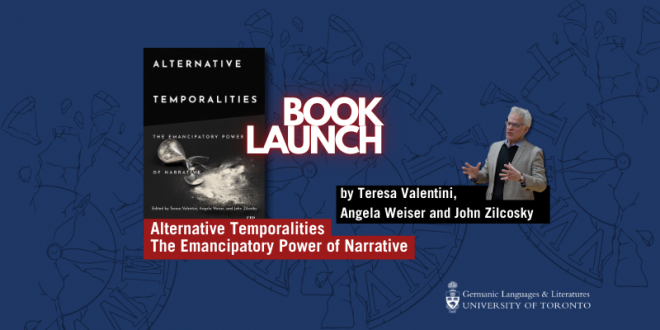The Department of Germanic Languages and Literatures is pleased to announce the publication of Alternative Temporalities: The Emancipatory Power of Narrative, co-authored by Teresa Valentini, Angela Weiser, and John Zilcosky.
About the Authors:
John Zilcosky is professor of German and Comparative Literature at the University of Toronto. He has won the MLA’s Scaglione Book Award and the Humboldt Foundation’s Bessel Research Prize. Zilcosky is a 2013 fellow of the US National Endowment for the Humanities and a 2022 Guggenheim Fellow.
Teresa Valentini is a recent PhD graduate from the Centre for Comparative Literature at the University of Toronto and the recipient of the two-year Faculty of Arts and Science Postdoctoral Fellowship Award at the University of Toronto. Her recent articles have appeared in Forum for Modern Language Studies, the James Joyce Quarterly, and Quaderni di Italianistica.
Angela Weiser is a writer and editor and holds an MA in Comparative Literature from the University of Toronto. Her projects include research assistance for the book Cloth that Changed the World: The Art and Fashion of Indian Chintz (Yale and Royal Ontario Museum, 2020) and corresponding exhibition at the Royal Ontario Museum.
About Alternative Temporalities: The Emancipatory Power of Narrative:
Alternative temporalities have often emerged as a reaction to the normativizing force of time, demonstrating that time can be used as an instrument of power and oppression, but also as a means to resist this very oppression. Alternative Temporalities draws on analyses of modern literature to examine this often-neglected role of time. By exploring forms of temporal resistance in artistic representation, such as short stories and novels, that challenge the imposition of colonial, gender, or capitalist temporal orders, the book reveals how storytelling can be an essential tool in questioning and pushing back against coercive temporal structures.
The book analyses literary representations of time that challenge dominant temporalities and intersect different disciplines such as gender and sexuality studies, trauma and Indigenous studies, race and identity, and religion. It features narrative analyses proposing alternative embodied experiences of time, focusing on topics including the temporality of the AIDS-affected body, the experience of time in prison, and slowness in opposition to modern acceleration. Ultimately, Alternative Temporalities aims to create new theories as well as practices that may foster more diverse and inclusive ways of perceiving and embodying time.
The book is available for purchase through University of Toronto Press.
 Department of Germanic Languages & Literatures University of Toronto
Department of Germanic Languages & Literatures University of Toronto



